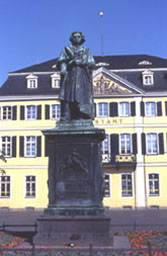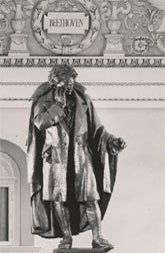1845 - 1900
Further development of the Bonn type of monument
When designing the Beethoven monument for Bonn, Ernst Julius Hähnel used a monument type that was quite popular
for the honouring of middle class artists, scholars and scientists in the 19th century. The depicted person
usually stood with their legs slightly apart on a more or less square pedestal which was decorated with
inscriptions and reliefs. In most cases they wore contemporary clothing as well as a large coat to enlarge them
optically and render them more monumental.
Other examples for this type of monument include the monument for Jean Paul in Bayreuth (1841), the Goethe
monument in Frankfurt (1844) and the Herder monument in Weimar (1850).
This way of depiction was popular all over Europe and continued well through the first half of the 20th century. German-American sculptor Theodore Bauer (1835-approx. 1902) reverted to it when creating the Beethoven statue for the Library of Congress in Washington D.C.



